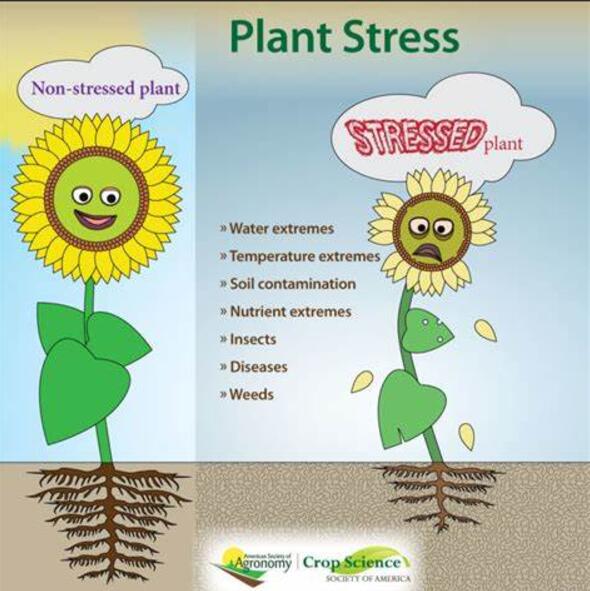Investigating frost response, rootstock-dependent cold tolerance, and floral bud mortality in apple cultivars through transcriptomic insights
IF 6.8
Q1 PLANT SCIENCES
引用次数: 0
Abstract
Late spring frosts threaten the productivity of deciduous fruit trees. In this study, we investigated frost tolerance in two apple (Malus domestica Borkh.) cultivars, ‘Fuji’ and ‘Gala’, grafted onto ten different rootstocks, over the springs of 2021–2023, to elucidate cold-responsive genes and regulatory mechanisms. Trees on the ‘B.9’ rootstock exhibited superior frost tolerance, with lower floral bud mortality compared to the susceptible ‘M.26’. Using RNA-sequencing, we analyzed floral buds (‘Gala’), scion leaves (‘Gala’), and rootstock sucker leaves (B9, M26). Samples were collected 12 h before and 6 h after a natural frost event in April 2021. Transcriptome analysis revealed extensive transcriptional changes, with 4549 genes upregulated and 5469 downregulated. Weighted gene co-expression network analysis (WGCNA) identified three significant modules based on module eigengenes (ME 6, ME 7, and ME 9) associated with the frost response. The ME 6 and ME 7 modules comprised 1210 and 1011 genes, respectively, while the ME 9 module included 163 genes, of which 6 were differentially expressed post-frost. Applying a 90 % module eigengene connectivity threshold, we identified key hub genes, including MdAFP (ABI five binding protein 3), MdCBF4 (C-repeat-binding factor 4), MdEXP8 (Expansin A8), MdHSFC1 (Heat shock transcription factor C1), MdHXXXD (HXXXD/BAHD-type acyl-transferase family protein), MdLRR-RK (Leucine-rich repeat receptor-like protein kinase), MdRPK2 (Receptor-like protein kinase 2), and MdWBC11 (White-Brown Complex homolog/ABC transporter protein). These findings elucidate the genetic basis of frost resilience in apple rootstocks and pinpoint potential targets for genetic enhancement of frost tolerance.
通过转录组学研究苹果品种的霜冻反应、砧木依赖的耐寒性和花芽死亡率
晚春霜冻威胁着落叶果树的产量。在本研究中,我们研究了两个苹果(Malus domestica Borkh.)品种“Fuji”和“Gala”在2021-2023年春季嫁接到10个不同砧木上的抗冻性,以阐明冷响应基因和调控机制。树在‘ B ’。9’砧木表现出较强的抗冻性,花芽死亡率低于易感品种‘M.26’。利用rna测序,我们分析了花蕾(‘ Gala ‘)、接穗叶(’ Gala ’)和砧木吸盘叶(B9, M26)。在2021年4月的一次自然霜冻事件发生前12小时和发生后6小时采集样本。转录组分析显示广泛的转录变化,4549个基因上调,5469个基因下调。加权基因共表达网络分析(WGCNA)基于模块特征基因(me6、me7和me9)确定了与霜冻响应相关的三个重要模块。me6和me7模块分别包含1210个和1011个基因,me9模块包含163个基因,其中6个是霜后差异表达基因。应用90%模块特征基因连接阈值,我们确定了关键枢纽基因,包括MdAFP (ABI 5结合蛋白3)、MdCBF4 (c -重复结合因子4)、MdEXP8(扩张蛋白A8)、MdHSFC1(热休克转录因子C1)、MdHXXXD (HXXXD/ bhd型酰基转移酶家族蛋白)、MdLRR-RK(富含亮氨酸的重复受体样蛋白激酶)、MdRPK2(受体样蛋白激酶2)和MdWBC11(白棕复合体同源物/ABC转运蛋白)。这些发现阐明了苹果砧木抗冻性的遗传基础,并确定了抗冻性遗传增强的潜在靶点。
本文章由计算机程序翻译,如有差异,请以英文原文为准。
求助全文
约1分钟内获得全文
求助全文
来源期刊

Plant Stress
PLANT SCIENCES-
CiteScore
5.20
自引率
8.00%
发文量
76
审稿时长
63 days
期刊介绍:
The journal Plant Stress deals with plant (or other photoautotrophs, such as algae, cyanobacteria and lichens) responses to abiotic and biotic stress factors that can result in limited growth and productivity. Such responses can be analyzed and described at a physiological, biochemical and molecular level. Experimental approaches/technologies aiming to improve growth and productivity with a potential for downstream validation under stress conditions will also be considered. Both fundamental and applied research manuscripts are welcome, provided that clear mechanistic hypotheses are made and descriptive approaches are avoided. In addition, high-quality review articles will also be considered, provided they follow a critical approach and stimulate thought for future research avenues.
Plant Stress welcomes high-quality manuscripts related (but not limited) to interactions between plants and:
Lack of water (drought) and excess (flooding),
Salinity stress,
Elevated temperature and/or low temperature (chilling and freezing),
Hypoxia and/or anoxia,
Mineral nutrient excess and/or deficiency,
Heavy metals and/or metalloids,
Plant priming (chemical, biological, physiological, nanomaterial, biostimulant) approaches for improved stress protection,
Viral, phytoplasma, bacterial and fungal plant-pathogen interactions.
The journal welcomes basic and applied research articles, as well as review articles and short communications. All submitted manuscripts will be subject to a thorough peer-reviewing process.
 求助内容:
求助内容: 应助结果提醒方式:
应助结果提醒方式:


